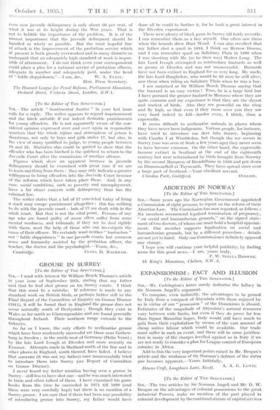[To the Editor of TILE SPECTATOR.] ' Sin,—The article "
Sentimental Justice in your last issue calls for a reply. The writer appears to regard imprisonment and the birch suitable if not indeed desirable punishments for young offenders. He-is not apparently aware of the con- sidered opinion expressed over and over again in responsible quarters that the whole regime and atmosphere of prison is disastrous, not only to boys and girls under 17, but also, in the view of many qualified to judge, to young people between 16 and 21. 'Statistics also could be quoted to show that the offender who has been birched is the quickest to return to the Juvenile Court after the commission of another offence. •
Figures which show an apparent • increase in ' juvenile ' delinquency should be examined with great Care if we are to learn anything froth them : they may only indicate a greater willingness to bring offenders into the Juvenile Court because Of the reforMs which have 'taken place there. ' And, in any ease; social conditions, such as poverty and unemployment, have a far closer concern with delinquency than has the criminal law.
The writer states that a lad of 17 convicted today of firing a stack may escape punishment altogether : this has nothing to do with the juvenile court : lads of 17 are dealt with in the adult court. But that is not the vital point. Persons of any age • who are found guilty of arson often suffer from some mental -weakness, and tribunals, if they are to deal rightly with them, need the help of those who can investigate the cause of their offence. We -certainly want neither " barbarism " not " futile sloppishness " in our juvenile courts but common sense and humanity assisted by the probation officer, the teacher, the doctor and the psychologist.—Yours, &c.,










































 Previous page
Previous page